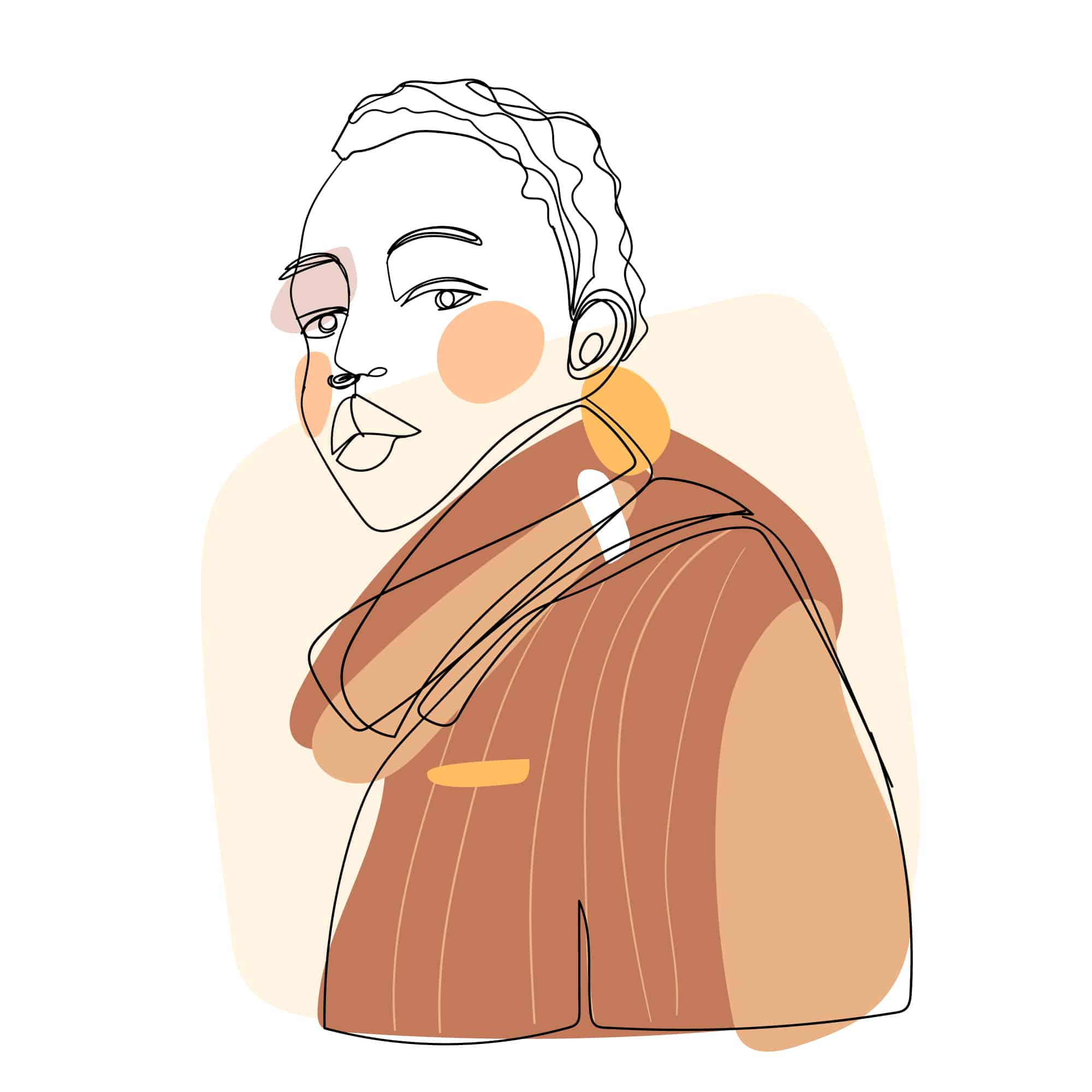am i highly sensitive?

imagine you just spent an afternoon with a dear friend. the first two hours huddled close in a cozy cafe deep in conversation. the kind of conversation that has you feeling connected and alive. not superficial or shallow but real and meaningful.
the next hour and half you wandered together through the warm halls of a well-lit, sparsely populated museum, absorbing walls upon walls of exquisite art. at times moved to tears by the beauty of it all.
afterwards your friend suggests dinner and a movie. you love her but the thought of more exhausts you. you need rest. you crave the quiet of your home. space to digest and recharge.
life as a HSP
this is an example of life as a highly sensitive person (HSP). the yearning for real, the love of beauty, the need for integration, the longing for connection and the capacity for deep feeling.
but where does all this fit in a fast, noisy, disembodied world? where do you fit?
until i read highly sensitive by dr. elaine aron, i thought something was wrong with me. how i felt so easily overstimulated by the world, how i required so much alone time, how much i felt and processed life.
reading highly sensitive and other books like it, was a revelation. putting into words what i’d always felt but never fully understood.
a HSP is someone who is highly attuned to their environment. aware of subtle changes in a space, affected by sounds, smells and sights. attentive to emotional states, energetic levels, and shifts in moods. often empathic and creative. prone to overstimulation and overwhelmed by the speed of the world and the loudness of the day-to-day.
someone who processes deeply, pursues meaning, and cultivates a rich inner life. a being who feels lost among the superficial and the shallow but finds true peace in the real and the authentic.
in their book sensitive, jenn granneman and andre solo describe “the sensitive way” as “the belief, deep down, that quality of life is more valuable than raw achievement, that human connection is more satisifying than dominating others and that your life is more meaningful when you spend time reflecting on your experiences and leading with your heart.”
take the HSP quiz
so where do you fall you on the spectrum of highly sensitive?
in the book sensitive jenn granneman and andre solo offer a checklist of the most common characteristics of sensitive people. take a moment to scan this list and see what resonates for you…
emotional sensitivity
- you feel strong emotions. you have a hard time shaking intense emotions like anger or worry.
- you have a lot of empathy, even toward strangers or people you only hear about in the news. you easily put yourself in other people’s shoes.
- other people’s moods really affect you. you easily absorb emotions from others, taking on their feelings as if they were your own.
- you have a hard time watching violent or scary movies or witnessing any kind of cruelty toward animals or humans.
- you read a room well.
- words really matter to you. you can’t easily brush off hurtful or critical words.
- you cry easily.
- you desire harmony in your relationships, so conflict can be very distressing for you, perhaps even make you feel physically ill. as a result, you may people-please or go to great lengths to avoid disagreements.
physical sensitivity
- you feel stressed and fatigued in loud, busy environments, like a crowded shopping mall, concert or restaurant.
- you need plenty of downtime to maintain your energy levels. you often find yourself withdrawing from other people so you can calm your senses and process your thoughts.
- you hate feeling rushed and prefer to do things carefully.
- sometimes your environment is your enemy. a chair with a hard back, lights that are too bright, and music that is too loud can make it feel impossible to relax or focus.
- you startle easily at sudden noises, like when someone sneaks up on you.
- your clothing really matters. scratchy fabrics or restrictive clothing – like pants with a tight waistband – can throw off your day.
- you seem to have a lower pain tolerance than other people.
- you are sensitive to changes in your diet and blood sugar levels. if you haven’t eaten in a while, you might get “hangry” (hungry + angry).
- for you, a little caffeine or alcohol goes a long way.
mental/spiritual sensitivity
- you tend to pause before acting, giving your brain time to do its work
- you notice subtle details, like the slight difference in shade between brushstrokes
- you read people well and can infer, with surprising accuracy, what they are thinking or feeling.
- you’re a perfectionist.
- you struggle to perform at your best under pressure, such as when your boss is evaluating your work or you are are participating in a competition.
- you’re a seeker. you think deeply about life and ask why things are the way they are. you may have always wondered why other people green’t as captivated by the mysteries of human nature and the universe as you are.
- your inner world is alive and present. you’ve been described as imaginative and creative.
- you have vivid dreams (and nightmares).
- you seem to have a harder time adjusting to change than other people.
- you’ve been called shy, picky, intense, dramatic, too sensitive, or high maintenance.
- you’ve also been called conscientious, thoughtful, wise, insightful, passionate, or perceptive.
- you desire depth and emotional intensity in your relationships. transactional or surface-level connections aren’t enough for you.
- your mind moves quickly. thus, you often feel out of sync with other people and this feeling can be profoundly lonely.
- you are self-reflective, knowing your strengths and weaknesses well.
- you are deeply moved by art and beauty, whether it’s a song, a painting, or just the way the sunlight hits the autumn leaves.

the HSP advantage
being a HSP holds many gifts that are needed by a culture eating itself up, bent on its own destruction. gifts like deep thinking, a highly attuned presence, a slower, quieter approach to life. but high sensitivity also brings challenges: we can become easily overstimulated, overwhelmed, and more susceptible to anxiety, depression, and low self-esteem.
as HSPs we need ways to come back to ourselves, ways to recharge and replenish, to soften and still. we need practices to calm our overthinking minds and soothe our strained nervous systems. to slow the fast, and quiet the loud. to help digest the human experience, and come back home to center.
because we are drawn to depth, growth and beauty and long for connection and meaning we also want practices that awaken our inner awareness, activate our intuition, and help us live a more aligned and authentic life.
HSPs thrive when living a more intimate life.
a life that is
- more present, embodied, whole.
- slower, softer, gentler.
- deeper, richer, truer.
- calmer, quieter.
- rooted, grounded, connected.
- vulnerable, open, heart-led.
the only way i know to do that is through breath and body. by quieting the mind, dropping into body and letting oneself be guided by heart.
breath & body practices for the HSP
these are big words and this is big work. but it is also simple work. it is also beautiful work.
it is devotion. devotion to what matters most, what you hold dear, and how you most want to live. devotion to your unique sensitivities and genius. devotion to you.
i practice quieting the mind and connecting to body and breath through two principle modalities: felt-sense meditation and conscious connected breath. i also incorporate my soul writing technique and intuitive movement. the more we wake up the fullness of who we are, drawing words up from heart, belly and pelvic bowl and drawing breath down into heart, belly and pelvic bowl, the closer we get to who we are and how we were made.
for HSPs, practices that cultivate calm and presence are essential. my work with felt-sense meditation helps you anchor into the present moment and ease the overthinking mind, while conscious connected breathing can create a deep sense of inner peace and groundedness. these techniques allow HSPs to reconnect to their own rhythm, slowing down the fast and quieting the loud, bringing you back to center.
if you’re ready to embrace your sensitivity as a strength, and to discover practices and rituals that help you thrive as the unique, beautiful being as you are,
begin your journey here.

with care and in devotion,
daphne
am i highly sensitive?

imagine you just spent an afternoon with a dear friend. the first two hours huddled close in a cozy cafe deep in conversation. the kind of conversation that has you feeling connected and alive. not superficial or shallow but real and meaningful.
the next hour and half you wandered together through the warm halls of a well-lit, sparsely populated museum, absorbing walls upon walls of exquisite art. at times moved to tears by the beauty of it all.
afterwards your friend suggests dinner and a movie. you love her but the thought of more exhausts you. you need rest. you crave the quiet of your home. space to digest and recharge.
life as a HSP
this is an example of life as a highly sensitive person (HSP). the yearning for real, the love of beauty, the need for integration, the longing for connection and the capacity for deep feeling.
but where does all this fit in a fast, noisy, disembodied world? where do you fit?
until i read highly sensitive by dr. elaine aron, i thought something was wrong with me. how i felt so easily overstimulated by the world, how i required so much alone time, how much i felt and processed life.
reading highly sensitive and other books like it, was a revelation. putting into words what i’d always felt but never fully understood.
a HSP is someone who is highly attuned to their environment. aware of subtle changes in a space, affected by sounds, smells and sights. attentive to emotional states, energetic levels, and shifts in moods. often empathic and creative. prone to overstimulation and overwhelmed by the speed of the world and the loudness of the day-to-day.
someone who processes deeply, pursues meaning, and cultivates a rich inner life. a being who feels lost among the superficial and the shallow but finds true peace in the real and the authentic.
in their book sensitive, jenn granneman and andre solo describe “the sensitive way” as “the belief, deep down, that quality of life is more valuable than raw achievement, that human connection is more satisifying than dominating others and that your life is more meaningful when you spend time reflecting on your experiences and leading with your heart.”
take the HSP quiz
so where do you fall you on the spectrum of highly sensitive?
in the book sensitive jenn granneman and andre solo offer a checklist of the most common characteristics of sensitive people. take a moment to scan this list and see what resonates for you…
emotional sensitivity
- you feel strong emotions. you have a hard time shaking intense emotions like anger or worry.
- you have a lot of empathy, even toward strangers or people you only hear about in the news. you easily put yourself in other people’s shoes.
- other people’s moods really affect you. you easily absorb emotions from others, taking on their feelings as if they were your own.
- you have a hard time watching violent or scary movies or witnessing any kind of cruelty toward animals or humans.
- you read a room well.
- words really matter to you. you can’t easily brush off hurtful or critical words.
- you cry easily.
- you desire harmony in your relationships, so conflict can be very distressing for you, perhaps even make you feel physically ill. as a result, you may people-please or go to great lengths to avoid disagreements.
physical sensitivity
- you feel stressed and fatigued in loud, busy environments, like a crowded shopping mall, concert or restaurant.
- you need plenty of downtime to maintain your energy levels. you often find yourself withdrawing from other people so you can calm your senses and process your thoughts.
- you hate feeling rushed and prefer to do things carefully.
- sometimes your environment is your enemy. a chair with a hard back, lights that are too bright, and music that is too loud can make it feel impossible to relax or focus.
- you startle easily at sudden noises, like when someone sneaks up on you.
- your clothing really matters. scratchy fabrics or restrictive clothing – like pants with a tight waistband – can throw off your day.
- you seem to have a lower pain tolerance than other people.
- you are sensitive to changes in your diet and blood sugar levels. if you haven’t eaten in a while, you might get “hangry” (hungry + angry).
- for you, a little caffeine or alcohol goes a long way.
mental/spiritual sensitivity
- you tend to pause before acting, giving your brain time to do its work
- you notice subtle details, like the slight difference in shade between brushstrokes
- you read people well and can infer, with surprising accuracy, what they are thinking or feeling.
- you’re a perfectionist.
- you struggle to perform at your best under pressure, such as when your boss is evaluating your work or you are are participating in a competition.
- you’re a seeker. you think deeply about life and ask why things are the way they are. you may have always wondered why other people green’t as captivated by the mysteries of human nature and the universe as you are.
- your inner world is alive and present. you’ve been described as imaginative and creative.
- you have vivid dreams (and nightmares).
- you seem to have a harder time adjusting to change than other people.
- you’ve been called shy, picky, intense, dramatic, too sensitive, or high maintenance.
- you’ve also been called conscientious, thoughtful, wise, insightful, passionate, or perceptive.
- you desire depth and emotional intensity in your relationships. transactional or surface-level connections aren’t enough for you.
- your mind moves quickly. thus, you often feel out of sync with other people and this feeling can be profoundly lonely.
- you are self-reflective, knowing your strengths and weaknesses well.
- you are deeply moved by art and beauty, whether it’s a song, a painting, or just the way the sunlight hits the autumn leaves.

the HSP advantage
being a HSP holds many gifts that are needed by a culture eating itself up, bent on its own destruction. gifts like deep thinking, a highly attuned presence, a slower, quieter approach to life. but high sensitivity also brings challenges: we can become easily overstimulated, overwhelmed, and more susceptible to anxiety, depression, and low self-esteem.
as HSPs we need ways to come back to ourselves, ways to recharge and replenish, to soften and still. we need practices to calm our overthinking minds and soothe our strained nervous systems. to slow the fast, and quiet the loud. to help digest the human experience, and come back home to center.
because we are drawn to depth, growth and beauty and long for connection and meaning we also want practices that awaken our inner awareness, activate our intuition, and help us live a more aligned and authentic life.
HSPs thrive when living a more intimate life.
a life that is
- more present, embodied, whole.
- slower, softer, gentler.
- deeper, richer, truer.
- calmer, quieter.
- rooted, grounded, connected.
- vulnerable, open, heart-led.
the only way i know to do that is through breath and body. by quieting the mind, dropping into body and letting oneself be guided by heart.
breath & body practices for the HSP
these are big words and this is big work. but it is also simple work. it is also beautiful work.
it is devotion. devotion to what matters most, what you hold dear, and how you most want to live. devotion to your unique sensitivities and genius. devotion to you.
i practice quieting the mind and connecting to body and breath through two principle modalities: felt-sense meditation and conscious connected breath. i also incorporate my soul writing technique and intuitive movement. the more we wake up the fullness of who we are, drawing words up from heart, belly and pelvic bowl and drawing breath down into heart, belly and pelvic bowl, the closer we get to who we are and how we were made.
for HSPs, practices that cultivate calm and presence are essential. my work with felt-sense meditation helps you anchor into the present moment and ease the overthinking mind, while conscious connected breathing can create a deep sense of inner peace and groundedness. these techniques allow HSPs to reconnect to their own rhythm, slowing down the fast and quieting the loud, bringing you back to center.
if you’re ready to embrace your sensitivity as a strength, and to discover practices and rituals that help you thrive as the unique, beautiful being as you are,
begin your journey here.

with care and in devotion,
daphne